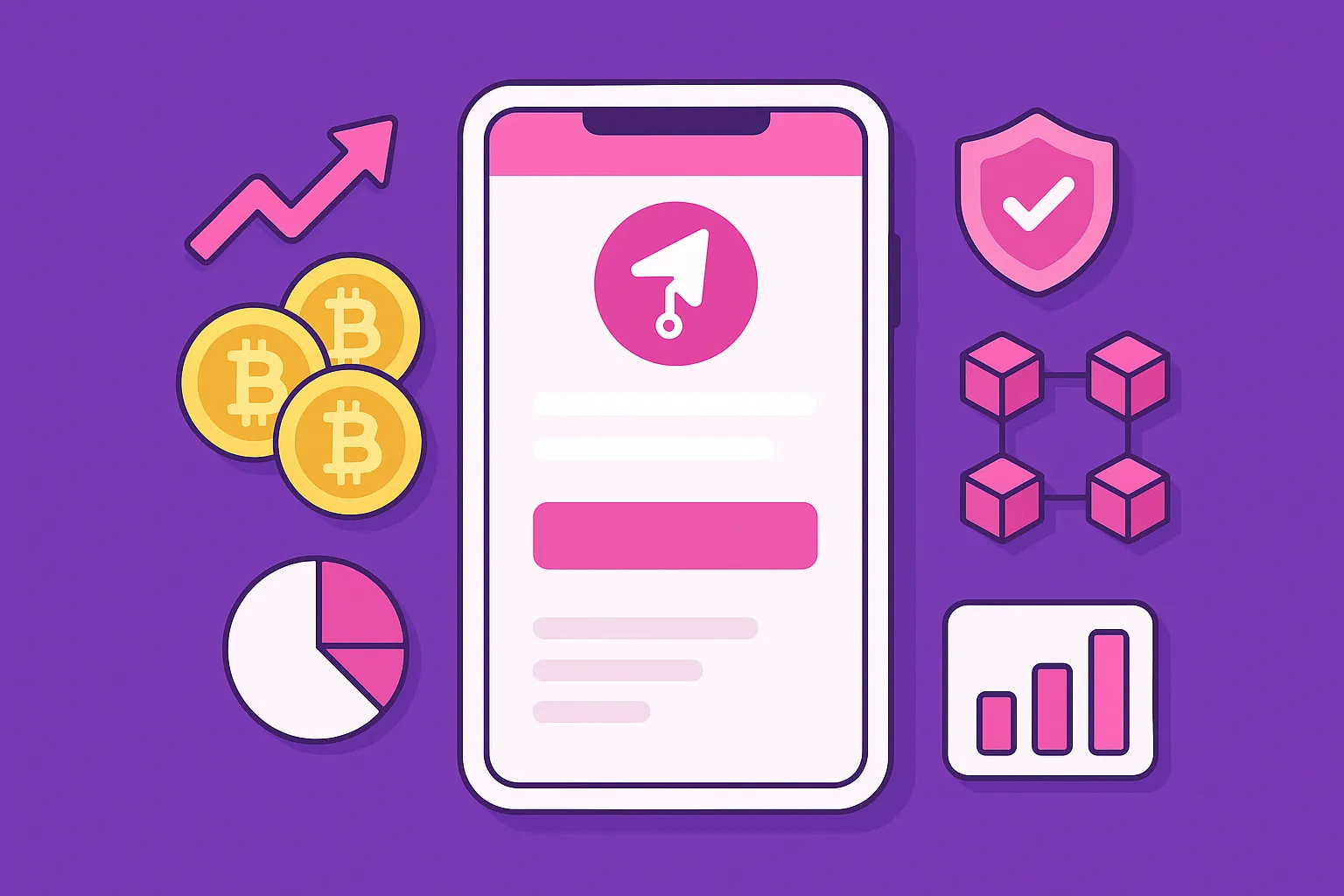Business Model of PinkSale has emerged as a powerhouse in the world of decentralized finance (DeFi), providing a platform for crypto projects to launch their tokens without relying on centralized exchanges. Its business model is a masterclass in combining automation, transparency, and community-driven fundraising.
Understanding how PinkSale makes money—and why it has attracted thousands of projects—is essential for any founder considering a similar launchpad platform. Whether you’re inspired to create your own DeFi launchpad or simply curious about token launch economics, PinkSale’s model offers valuable lessons you can apply.
What is PinkSale & How It Works
The Problem PinkSale Solves
Launching a new cryptocurrency token traditionally meant dealing with centralized exchanges, hefty listing fees, and complex technical requirements. PinkSale solves this by offering a decentralized, user-friendly launchpad where projects can raise funds, create liquidity pools, and lock tokens—all without middlemen.
Who Uses PinkSale
- Crypto project founders who need to launch tokens quickly
- Investors and traders looking for early access to promising projects
- Communities supporting DeFi innovation and fair launches
How the Platform Work Operates
- Project Listing: Founders create presale pools, set fundraising goals, and customize vesting schedules.
- KYC & Audits: Optional verification services increase trust and credibility.
- Token Sale: Investors contribute funds, typically in BNB or ETH, during a presale.
- Liquidity Locking: PinkSale automatically locks liquidity on platforms like PancakeSwap to protect buyers.
- Distribution: Tokens are distributed based on preset vesting rules.
This process allows anyone—from seasoned DeFi teams to first-time founders—to launch tokens transparently and efficiently.
Read More : What is a PinkSale App and How Does It Work?
Target Audience for Your Platform
PinkSale’s success is rooted in its ability to serve a wide range of users who share one thing in common: a desire to participate in token launches without relying on centralized gatekeepers.
Here’s who typically uses PinkSale:
- Crypto Project Teams:
Startups and DAOs seeking to fundraise, build community, and launch tokens quickly.They value PinkSale’s streamlined presale creation tools and built-in liquidity locks, which eliminate the need for costly centralized exchange listings. - DeFi Enthusiasts:
Investors eager to discover and participate in early-stage presales.They use PinkSale to find promising new tokens before public exchange listings, giving them a first-mover advantage - Token Traders:
Users looking to acquire tokens at presale pricing before public listings.These traders closely monitor presale schedules and vesting timelines to maximize profits. - Community Managers:
Teams that leverage PinkSale’s tools to engage supporters and grow their ecosystems.They use referral programs, featured listings, and customizable campaigns to build excitement around new token launches. - Blockchain Developers:
Builders integrating smart contract functions and liquidity locks into their launches.They appreciate PinkSale’s developer-friendly infrastructure, which simplifies contract deployment across multiple blockchains.
By catering to both project creators and retail investors, PinkSale sustains a dynamic marketplace with constant liquidity and trading activity.
Features that Support the Business Model
PinkSale has built a suite of features that not only attract projects and investors but also drive consistent revenue. Here are the core features that fuel its business model:
- Presale Creation Tool
A simple interface that lets projects set up token sales, define soft and hard caps, and configure timelines—all without coding. - Liquidity Locking
PinkSale locks liquidity on decentralized exchanges like PancakeSwap, boosting investor trust and generating locking fees. - KYC Verification
Projects can undergo optional KYC checks to display a verified badge, encouraging more confident participation (and paying verification fees). - Audit Services
PinkSale offers smart contract audits through partner providers, earning commissions while improving project transparency. - Tiered Launch Options
Different packages—Free, Standard, Premium—come with varying levels of exposure, customization, and featured listings. - Referral Program
Community members earn a percentage of fees by referring projects, incentivizing word-of-mouth growth. - Vesting and Distribution Automation
Tools for scheduling token releases and automating vesting, creating stickiness with project teams.
These features work together to create multiple monetization channels while providing clear value to both creators and investors.
Read More : Best Pinksale Clone Scripts in 2025: Features & Pricing Compared
Revenue Streams of PinkSale
PinkSale’s revenue model is built on capturing value from every stage of the token launch process. Below is a clear table and explanation of how the platform earns money:
| Revenue Stream | How It Works |
| Presale Creation Fees | Projects pay fees to list presales on the platform. |
| Liquidity Lock Fees | Fees are charged when liquidity is locked post-sale. |
| KYC Verification Fees | Optional KYC services are available for an additional charge. |
| Smart Contract Audit Fees | Projects can pay for audits; PinkSale takes a commission. |
| Featured Listings | Projects pay to appear on the homepage and in promoted sections. |
| Referral Commissions | A portion of fees goes to referrers, but PinkSale keeps the rest. |
| Token Vesting Services | Fees for setting up and managing vesting schedules. |
Detailed Breakdown:
- Presale Creation Fees:
Each project pays a fixed fee or a percentage of the total raised amount. - Liquidity Lock Fees:
Locking liquidity creates long-term trust and steady fee income. - KYC Verification Fees:
Projects pay extra for identity verification badges, which often increase investor confidence. - Audit Fees:
PinkSale partners with auditing firms and earns a commission when projects order audits. - Featured Listings:
Projects pay to be prominently displayed, improving visibility and boosting conversions. - Referral Program:
Community promoters bring in projects and receive a percentage, while PinkSale retains the remainder of the fees. - Vesting Automation:
Ongoing revenue from teams that use vesting and distribution tools.
Cost Structure Behind the Platform
Running a decentralized launchpad like PinkSale involves several recurring and one-time expenses. Understanding these costs is crucial if you’re planning to build your own platform.
Here are the main expense categories:
- Smart Contract Development and Maintenance
Ongoing updates to smart contracts for presales, liquidity locks, and vesting schedules. This work includes patching vulnerabilities, adding new blockchain integrations, and ensuring contracts comply with emerging standards. - Platform Infrastructure
Hosting servers, blockchain nodes, and databases to ensure uptime and scalability.As traffic increases, infrastructure must scale securely to handle thousands of simultaneous users. These costs also cover data backups, load balancers, and redundancy systems. - Security Audits
Regular audits of the platform’s codebase to protect funds and maintain trust. Professional auditors review every contract and backend process to identify weaknesses. Reputable audits are a major expense but critical for attracting serious projects and investors. - Customer Support & Moderation
A team dedicated to answering questions, resolving disputes, and managing community channels. Support staff also handle onboarding assistance and educational resources for project teams. Effective moderation protects the community from scams and misinformation. - Marketing and Promotions
Campaigns to attract both new projects and investors, including bounties and partnerships. These expenses can include influencer partnerships, paid ads, social media campaigns, and listing incentives. Continuous marketing helps sustain platform growth in a competitive space. - Legal and Compliance
Costs associated with regulatory compliance and KYC service providers. This includes drafting terms of service, privacy policies, and ensuring operations adhere to evolving crypto regulations. Staying compliant helps avoid fines and reputational damage. - Partnership Commissions
Revenue shares with auditors, referral partners, and other ecosystem players. These commissions incentivize ecosystem participants to promote and integrate with the platform. While they reduce gross margins, they help drive network effects and long-term growth.
These expenses scale as your platform grows, which is why efficient automation and clear fee structures are so important.
2024–2025 Innovations or Updates
PinkSale has continued to evolve to stay ahead of competitors and meet the rising expectations of crypto founders and investors. Here are some of the most notable updates and strategic shifts over the last year:
- Multi-Chain Launch Support
PinkSale expanded beyond Binance Smart Chain to include Ethereum, Polygon, and other networks. This multi-chain strategy helps projects reach more communities and liquidity pools. - Dynamic KYC & Audit Options
New partnerships have allowed projects to choose between different audit firms and KYC tiers, creating flexible trust solutions while unlocking new revenue streams. - Launchpad Tiers & Subscription Plans
Instead of one-size-fits-all fees, PinkSale introduced subscription models and premium tiers, allowing frequent launchers to access bundled services. - Enhanced Vesting and Locking Modules
Improved tools for custom token release schedules and liquidity locks to align with complex tokenomics. - Updated UI/UX
A refreshed user interface and smoother onboarding process for both investors and project teams, improving conversion rates. - Stronger Anti-Bot Measures
New verification layers and smart contract improvements to reduce bot participation and manipulation during presales.
These innovations position PinkSale as a modern, full-service launchpad catering to the needs of serious blockchain entrepreneurs.
Takeaways for Startup Founders
If you’re considering launching your own DeFi token launchpad or any similar marketplace platform, there are important lessons you can learn from PinkSale’s business model:
- Diversify Revenue Streams Early
PinkSale doesn’t rely on a single fee. It combines listing fees, liquidity locks, audits, KYC services, and featured promotions. Multiple income channels create stability. - Build Trust Mechanisms
KYC badges, liquidity locks, and audits help projects stand out and attract serious investors. Prioritize tools that build transparency and credibility. - Embrace Multi-Chain Compatibility
Supporting multiple blockchains is no longer optional. It expands your user base and gives projects more launch options. - Automate Everything You Can
From vesting schedules to liquidity locks, automation reduces manual work and lowers operational costs as you scale. - Invest in a Clean, Intuitive UI
A polished user experience increases conversions and builds confidence in your platform.
Read more : Pre-launch vs Post-launch Marketing for Pinksale Clone Startups
At Miracuves, we specialize in helping founders like you bring these ideas to life. Our Pinksale development solutions include all the core features you’ve read about—plus customization to fit your unique vision.
Whether you want to launch on BSC, Ethereum, or Solana, our ready-made frameworks and experienced team can help you go to market faster, without compromising on quality or security.
Conclusion :
PinkSale has proven that a decentralized launchpad can thrive by combining automation, trust, and diverse revenue streams. Its business model demonstrates how smart contract-driven platforms can monetize at every step—from presale setup to liquidity locking—while providing real value to both creators and investors.
If you’re inspired to build your own DeFi launchpad or token sale platform, you don’t have to start from scratch. At Miracuves, we help founders launch robust, secure, and scalable platforms that rival market leaders.
With our Pinksale solution, you can get to market faster, control your revenue model, and customize every detail to fit your brand.
Ready to bring your vision to life?
Contact Miracuves today and let’s build something extraordinary together.
FAQs :
1. How does PinkSale make money?
PinkSale earns revenue from multiple sources, including presale creation fees, liquidity lock fees, KYC verification charges, smart contract audit commissions, and featured listing promotions. This diversified model ensures steady cash flow from every stage of a project launch.
2. Is PinkSale only available on Binance Smart Chain?
No. PinkSale started on Binance Smart Chain but has expanded to support Ethereum, Polygon, and several other blockchains. This multi-chain strategy helps projects reach broader audiences and liquidity.
3. What makes PinkSale different from other launchpads?
PinkSale stands out because it automates key processes like liquidity locking and vesting while offering optional trust services like audits and KYC. Its user-friendly interface and built-in marketing tools also give projects more visibility and control.
4. Can I build a similar launchpad for my own brand?
Absolutely. With solutions like the Pinksale you can create a customized launchpad tailored to your business goals, including your own fee structures, blockchain support, and unique branding.
5. How long does it take to develop a launchpad platform?
Timelines vary based on customization. With Miracuves’ ready-made frameworks, you can launch significantly faster—often within a few weeks—compared to building everything from scratch.
Related Articles :








